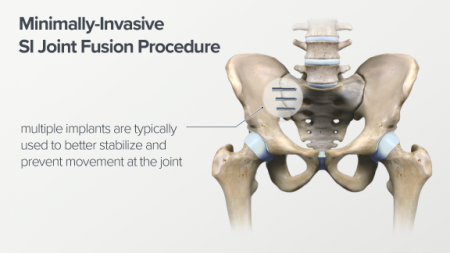Estimated reading time: 5 minutes
One day the first grade teacher was reading the story of Chicken Little to her class. She came to the part of the story where Chicken Little tried to warn the farmer. She read, “…. and so Chicken Little went up to the farmer and said, “The sky is falling, the sky is falling!”
The teacher paused then asked the class,
“And what do you think that farmer said?”
One little girl raised her hand and said,
“I think he said: ‘Holy shit! A talking chicken!'”
We are on our way to Friday…a good thing! Looks like the shot in the back has worked as most of the pain has diminished. We are scheduled to see the doctor next week to plan for the future.
The most common method of sacroiliac joint fusion is a minimally-invasive procedure, performed through a small incision in the buttock. Open sacroiliac joint fusion is rarely used due to extensive healing processes and higher complication rates.
Implant systems for SI joint fusion have been developed in recent years that allow the procedure to be minimally invasive. The most commonly used systems have been shown to relieve excessive motion at the joint through fusion, minimizing pelvic and lower back pain. Additionally, these systems have been shown to cause fewer complications and require a less-extensive recovery process than open fusion surgeries.
A typical SI Joint fusion procedure typically consists of the following basic steps:
- The patient lays prone (face down) on the operating table under general anesthesia.
- A small incision, usually ranging from 2 to 3 centimeters, is made in the side of the buttock and the gluteal muscles are dissected to access the ilium.
- A small guide pin is inserted through the side of the ilium to create a small hole allowing access to the ilium.
- This opening is then broached or drilled through the ilium to provide passage for the implants to reach the sacrum.
- If a bone graft is necessary, the SI joint is cleared of cartilage and soft tissues, and a bone graft is packed into the joint space.
- The bone graft is typically collected from a different area of the ilium or from shavings left behind from broaching the ilium.The implant instruments are guided through the passage in the ilium, and are put into place using screws, pins, or a mallet.
- The incision site is then irrigated using a saline solution, which removes any debris from the wound before it is closed. Then, the incision is closed in layers using standard sutures
Rehabilitation following SI joint fusion is determined by a combination of factors, such as the systems used to fuse the joint (such as instrumentation and bone grafting), the severity of symptoms prior to surgery, and the surgeon or physical therapist’s preferences for rehabilitation. Because the bone fuses during the healing time following the surgery, continued pain and other symptoms can be expected, but will typically begin to alleviate within a few weeks.
The entire recovery process for sacroiliac joint fusion can take up to 6 months.
Anyway.. those are decisions we have to make so now we celebrate Thursday!
We are expecting Robin and Bob back in the good ol’ US of A tomorrow so they are making their way around Paris trying to find the airport! We really missed them!
The Sun was in and out most of the walk but when it was “out” the flowers were amazing! No map today but we are about to hit 250 miles…
The white roses were all over the streets as they seem to be a favorite in our neighborhood!
The flowers almost look like yellow broccoli as they are munched together and thick!
Paul worked in the garage in the afternoon and then we headed to the Phoenix Club where we danced in the Pavillion! We had a gift for Connor but alas, he was a no-show tonight!
LINE DANCE… and the boys got up! Paul was going to join in but, alas, he took the evidence!
Girls! Girls! DO NOT STARE!
We danced a couple of dances and the pain was noticeable different! We departed about 9:30 PM and headed for home. A great day!










